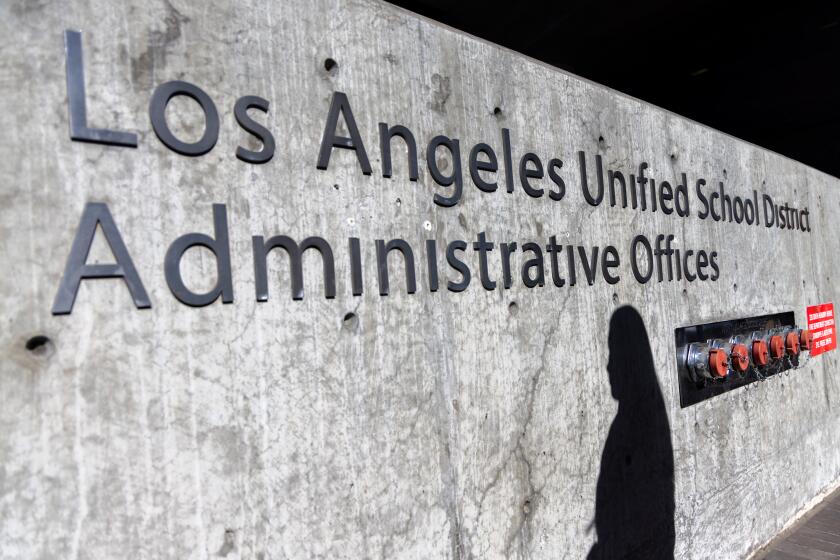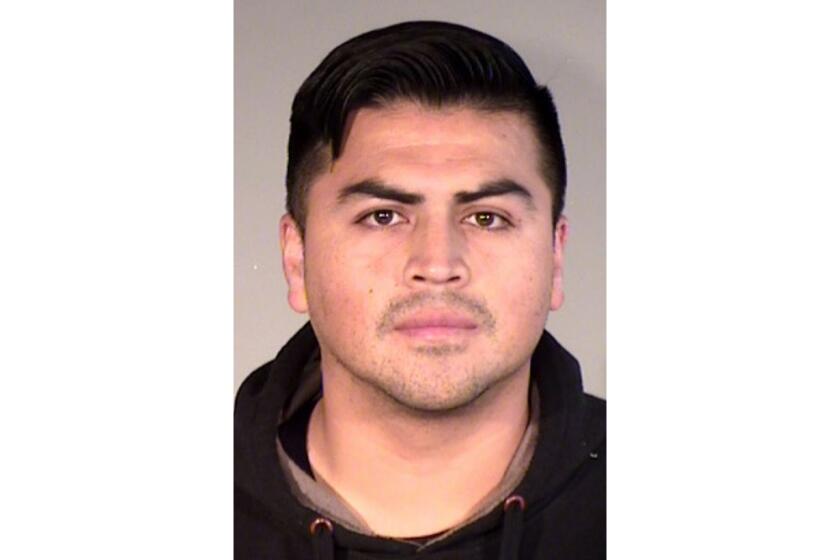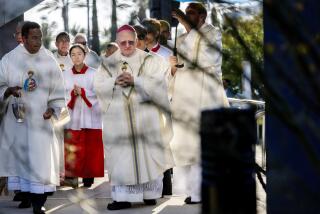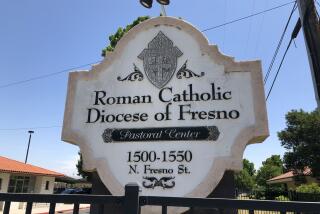L.A. Catholic church covered up molesting priests for decades. The price: $1.5 billion and so much pain

- Share via
- The payout reflects its rank as the largest archdiocese in the nation, with more than 4 million members, and a California law that gave accusers more time to file suit.
- It also underscores the failures of church leaders to identify molesting priests and prevent them from committing more crimes.
Clergy sex abuse scandals have rocked Catholic churches across the world, but few places have seen the financial toll of the Los Angeles Archdiocese.
With a record $880-million settlement with victims announced this week, the Los Angeles Archdiocese has now paid out more than $1.5 billion.
The bill reflects its rank as the largest archdiocese in the nation, with more than 4 million members, and a California law that gave accusers more time to file suit.
But attorneys and others who have been involved in more than two decades of litigation say it also is an indication of the failures of church leaders to identify molesting priests and prevent them from committing more crimes.
Some of those priests, after undergoing treatment at residential centers, were shuffled to new parishes, frequently in immigrant neighborhoods where the abuse would continue.
With the latest settlements, the number of people alleging abuse now stands at nearly 2,500.
But the true number could be much higher, lawyers say.
One reason for the size of L.A.’s payout is that the California Legislature in 2019 opted to give adults more time to file lawsuits over childhood sexual abuse, which prompted more survivors to come forward. This extended the amount of time available for litigation compared with other states, which were also roiled by abuse scandals.
“The L.A. archdiocese is not an anomaly,” attorney Mike Reck said. “It’s larger and been subject to more litigation and so we have found out a lot more about how it operated. I am not sure the archdiocese is worse than other places. I think we just don’t know as much about other dioceses.”
The abuse — and efforts to cover it up — dates back decades.
It reaches into the highest levels of the church. Msgr. Benjamin Hawkes, the second-in-command to two cardinals and a well-known leader who was the inspiration for Robert De Niro‘s character in the movie “True Confessions,” was accused after his death of abuse.
Troves of church documents that served as a road map for the cover-up placed extreme scrutiny on Cardinal Roger Mahony, whose handling of clergy abuse has been roundly criticized.
Mahony, the archbishop of Los Angeles for more than two decades, was a youthful and high-profile leader who used his position atop the diocese in the 1980s and 1990s to champion social and economic justice, among other causes large and small. But his legacy was obliterated after it was revealed that he supervised the reassignment of numerous priests who admitted to or were accused of molesting young children.
With the behavior left unchecked, the number of victims within the largest archdiocese in the United States grew exponentially.
“The real fault lies at the feet of Roger Mahony,” said attorney John Manly, who for decades has represented victims of sexual abuse. “He could have come here in 1986 and made the change. Instead, he chose to conceal it from the public, the media and, more importantly, law enforcement.”
The Archdiocese of Los Angeles has agreed to pay $880 million to victims of clergy sexual abuse in the largest settlement involving the Catholic Church.
The culture of secrecy and the practice of shifting accused priests between parishes rather than alerting law enforcement — a feature of the scandal that played out in dioceses across the country — was also a persistent issue in Los Angeles. Delayed enforcement against the accused priests allowed them to move between locations and abuse other children, victims’ advocates say.
The list of abusers within the Archdiocese in Los Angeles includes more than 500 names, according to the Survivors Network of those Abused by Priests.
“There has been a continuous, uninterrupted flow of hundreds of perpetrators in the Archdiocese of Los Angeles,” said Patrick Wall, an advocate for survivors of sexual abuse and a former Benedictine monk.
Mahony could not immediately be reached for comment.
Mahony wrote in a letter in 2013 that he had made “mistakes” in handling sexual abuse, but added that he followed the procedures that were in place at dioceses across the country: to remove priests from active ministry if there was reasonable suspicion that abuse had occurred and refer them to a residential treatment center.
He did not know at the time, he wrote, that “following these procedures was not effective, and that perpetrators were incapable of being treated in such a way that they could safely pursue priestly ministry.”
“Nothing in my own background or education equipped me to deal with this grave problem,” he wrote.
Los Angeles Archbishop Jose Gomez in 2013 temporarily relieved Mahony of all public duties over his mishandling of the sex abuse scandal, a move that was unprecedented at the time in the American Catholic Church.
Mahony, now in his late 80s, lived for several years on the campus of a parish in the San Fernando Valley. After his retirement, he vowed to devote more time to immigration reform, a lifelong passion for him that stems from his experiences with migrant workers in the fields of the San Joaquin Valley during his years in the Fresno and Stockton diocese.
The church’s own records, shielded by an army of lawyers for decades, revealed an orchestrated conspiracy to prevent authorities from learning of criminal behavior.
In memos written in 1986 and 1987, Msgr. Thomas Curry, then the archdiocese’s advisor on sex abuse cases, proposed ways to prevent police from investigating priests who had admitted to church officials that they abused children. Curry suggested to Mahony that the diocese prevent the priests from seeing therapists who might alert authorities and that they give the priests out-of-state assignments to avoid a criminal investigation.
Msgr. Peter Garcia admitted to church officials to preying on undocumented children in predominantly Spanish-speaking parishes. After he was discharged from a treatment center, Mahony told him to stay away from California to avoid legal repercussions, according to internal church files.
“I believe that if Monsignor Garcia were to reappear here within the archdiocese we might very well have some type of legal action filed in both the criminal and civil sectors,” the archbishop wrote to the treatment center’s director in July 1986.
Garcia left the priesthood in 1989 and was never prosecuted. He died in 2009.
The payout settles claims that the three former students were sexually abused by a Langdon Avenue Elementary School teacher repeatedly during school hours in 2006 and 2007.
Another priest, Father Michael Baker — one of the church’s most prolific abusers — had been accused of molesting at least 40 boys during his decades in the priesthood. In 2007, Baker pleaded guilty in criminal court to abusing two boys. He was sentenced to 10 years in prison but was released in 2011 based on the time he’d served in county jail and good behavior.
Two brothers alleged that Baker began abusing them at St. Hilary Catholic Church in Pico Rivera in 1984 when they were 5 and 7, according to court records. The boys’ family moved to Mexico in 1986, but Baker, over the next 13 years, flew them to Los Angeles, Palm Springs and Arizona, where the abuse allegedly continued until 1999, at least once in the priest’s rectory in Los Angeles County, court records show.
Records show that Mahony knew about Baker’s sexual abuse of boys decades before it came to light publicly.
In 1986, Baker first broached the topic in a note to the cardinal after Mahony appealed for priests to report inappropriate behavior, according to internal church records.
“During the priest retreat … you provided us with an invitation to talk to you about the shadow that some of us might have,” Baker wrote. “I would like to take you up on the invitation.”
A former priest in the Archdiocese of Los Angeles is scheduled to be sentenced in Ventura County in December in connection with his child pornography case.
At a spiritual retreat in December 1986, Baker made a full confession and was transferred to a treatment facility in New Mexico. The police were not notified, and no effort was made to contact the children who had been abused, according to church records.
Baker returned to ministry in the Los Angeles Archdiocese in 1987, church records show. At the time, Mahony informed Baker that he was not permitted to be left alone with a child, but records show that Baker violated this directive on at least three occasions, all of which were observed by archdiocesan personnel.
Baker remained in the ministry until 2000, when he was defrocked, church records show. In 2002, as the clergy abuse scandal came to light, The Times revealed that the archdiocese secretly paid $1.3 million to two of Baker’s victims two years before.
More to Read
Sign up for Essential California
The most important California stories and recommendations in your inbox every morning.
You may occasionally receive promotional content from the Los Angeles Times.















